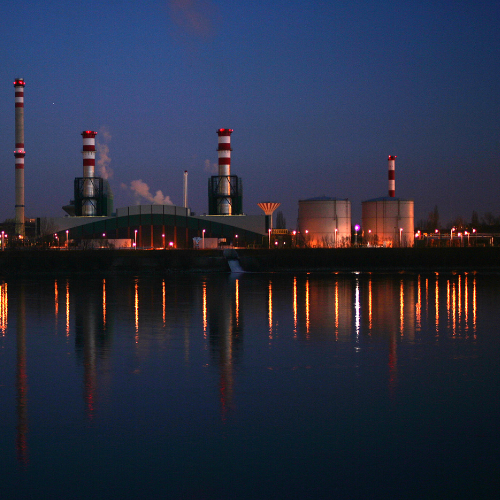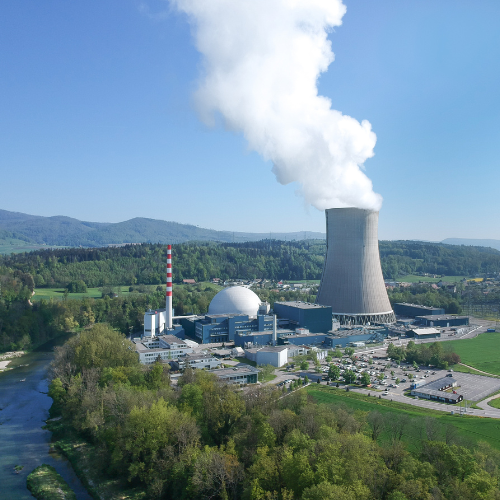Thermal Assets
(GRI 305-1, GRI 305-2, GRI 305-3, GRI 305-4, GRI 305-7)

Thermal power plants, which comprise gas-fired combined cycle and nuclear power plants, convert fuels into heat, mechanical or electrical energy. Thanks to the high degree of flexibility of gas-fired power plants, they are ideally suited for the balancing of load fluctuations in the electricity grid. They thus play an important role in maintaining system stability.
Gas-fired combined cycle power plants (CCGTs)
Thanks to their high electrical efficiency and flexibility, gas-fired combined cycle power plants are among the most efficient conventional power plants. We have shareholdings of up to 100% in gas-fired power plants in Hungary, Italy and Spain. In addition to the production of electricity, these plants fulfil numerous requirements, for example through their ability to supply additional district heating or black-start capability.
They also contribute to security of supply during the current transformation of the energy supply. Alpiq has set itself the goal of reducing greenhouse gas emissions over the next few years – during which the CCGTs will continue to be operated for the reasons mentioned above – through targeted technical and operational measures such as the installation of more efficient turbines and the blending of the natural gas with green gas (e.g. biogas, hydrogen).
Annual inspections guarantee occupational safety and compliance with environmental management standards. Our Alpiq Group strategy is to further improve the efficiency of our gas-fired power plants. We want to be the best owner of these power plants by deriving the maximum from the existing facilities while minimising emissions, e.g. of CO2 and nitrogen oxide, and by converting existing sites to the next generation of technology.
In 2023, Alpiq made progress on several projects to increase the contribution of CCGT power towards system stability. The CCGT in Spain, Plana del Vent, contributed to provide the flexibility and backup capacity required by the system operator, in a market context characterised by a very significant increase in the installed capacity of renewable generation, mainly photovoltaic energy. In July 2023, the San Severo CCGT plant in Foggia, Italy started participating in PICASSO, the European platform for automatic frequency restoration reserves (aFRR). The project to upgrade the San Severo plant also began in October, during a scheduled shutdown. The full upgrade, which includes a second implementation step in 2025, is aimed at increasing the power output by 43 MW and net efficiency by 1%. In addition, the plant will be ready for H2 blending.
In Hungary, efficient heat generation and flexibility were further improved at the CCGT power plant site in Csepel. In 2022, a heat storage facility with a capacity of around 300 MWh was built at the site to improve the efficiency of heat generation by creating storage options for heat in the form of 8,000 m3 of hot water. In 2023, this led to a high level of expertise in optimising natural gas procurement and concentrating heat generation on times of maximum efficiency. In addition to improving the average efficiency of heat generation, the storage solution allowed us to utilise the maximum capacity of our flexible cogeneration (Combined Heat and Power) plant. By investing in this capacity expansion, our electric boiler was able to feed 17% more flexibility (+5 MW) into the grid as from summer 2023, which contributed to better integration of renewable technologies into the Hungarian system.
Nuclear power plants
Nuclear energy has historically played a significant role in ensuring Switzerlandʼs security of supply and remains an important pillar in Alpiqʼs production portfolio for climate-friendly electricity. In Switzerland, Alpiq has a share of 40% in Kernkraftwerk Gösgen-Däniken AG (KKG), 27.4% in Kernkraftwerk Leibstadt AG (KKL), and 33% in Centrales nucléaires en participation SA (CNP). Alpiq holds the executive management mandate for KKG and CNP. To actively support the energy transition and continue to make an important contribution to security of supply, Alpiq is preparing for longer operating times for its nuclear power plants, while placing the highest priority on guaranteeing safety.
Alpiq is fully aware of its responsibility and obligation towards the environment and society. We present selective data regarding the impact of nuclear energy on sustainability in section 6.3 (“Use of resources in nuclear power plants and nuclear waste”) even if Alpiq is not a majority shareholder. Additional information, which does not form part of this report approved by the Board of Directors, can be found in the following document. Comprehensive sustainability information can be found in the independent sustainability reports of KKG and KKL, which are expected to be published by the companies in summer 2024.
Milestones
- San Severo CCGT plant entered the European platform for the exchange of balancing energy
- Start of project to upgrade San Severo CCGT plant to increase efficiency and enable H2 blending
- Start of Long-Term Operation Strategy project to examine lifetime extension of Gösgen (KKG)
Numbers
- 3,121 GWh produced in our CCGT plants in 2023, a level in line with historical production before the peak of 2022
- 6,595 GWh produced by our nuclear assets
- 605,000 – number of households whose energy needs could be covered by the energy produced by Plana del Vent in 2023
Frameworks/Standards
Paris Climate Agreement, ISO14001, ISO 9001, ISO 55001, ISO 45001, Eco-Management and Audit Scheme (EMAS), Greenhouse Gas Protocol, IAEA Convention on Nuclear Safety (INFCIRC/449), IAEA Joint Convention on the Safety of Spent Fuel Management and on the Safety of Radioactive Waste Management (INFCIRC/546)
Success stories
Beáta Leveles – ensuring emissions compliance at Csepel CCGT
In her role as Environmental Manager at the Csepel CCGT in Hungary, Beáta ensures compliance with all the environmental regulations. Since its commissioning in 2000, a sophisticated monitoring system has been in place that Beáta uses to monitor the key environmental factors and minimise emissions.
More information

Switzerland to use nuclear energy longer than expected
Switzerland plans to keep nuclear plants in use longer than previously expected over fears of electricity shortages, mirroring a broader trend of European countries revisiting the potential of atomic energy. Operators Axpo Holding AG and Alpiq Holding AG have boosted the planned lifespan for their plants to 60 years, which would see them operate until around 2040.
More information
